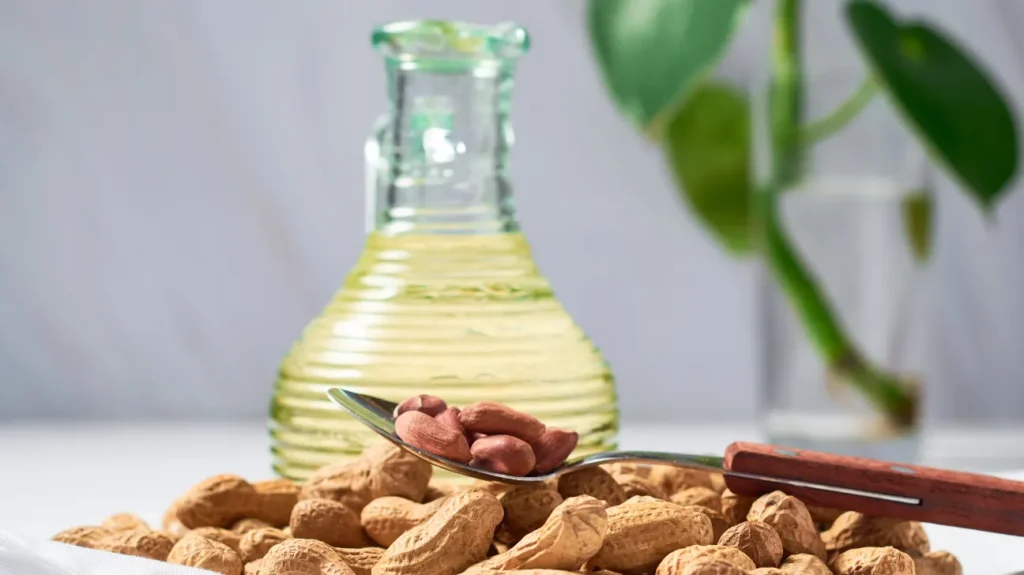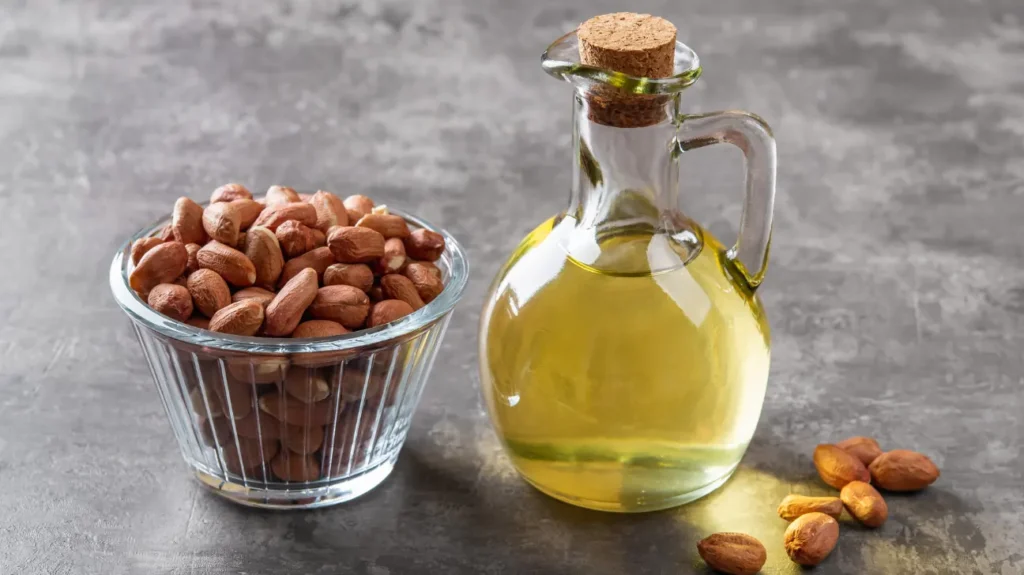Peanut oil, extracted from the seeds of the Arachis hypogaea plant (commonly known as peanuts), is widely known for its culinary uses due to its high smoke point and mild flavor. However, beyond its utility in the kitchen, peanut oil is rich in bioactive compounds, such as unsaturated fatty acids, antioxidants, and phytosterols, that contribute to its health-promoting properties. Increasing interest in the use of natural oils as supplements has brought attention to the potential nootropic benefits of peanut oil, particularly regarding cognitive health, inflammation reduction, and neuroprotection.
This article explores peanut oil’s chemical composition, physiological effects on the brain and body, its potential as a nootropic supplement, appropriate dosage guidelines, possible side effects, interactions with other supplements and medications, and safety considerations.
You May Also Like:
Soybean Oil: Benefits, Dosage, Side Effects, Drug Interactions, and Other Important Information
Sunflower Oil: Benefits, Dosage, Side Effects, Drug Interactions, and Other Important Information
Sources of Peanut Oil
Peanut oil is primarily extracted from the seeds of the peanut plant, which is native to South America but is now grown worldwide. The oil can be produced through various methods:
- Refined peanut oil: This type of oil undergoes extensive processing to remove impurities and allergens. It is commonly used for cooking and is often marketed as allergen-free.
- Cold-pressed peanut oil: This is extracted without the use of heat or chemicals, preserving more of the natural nutrients and bioactive compounds, such as antioxidants and unsaturated fats.
- Gourmet roasted peanut oil: Made from roasted peanuts, this oil retains a strong peanut flavor and aroma, making it more suitable for culinary use than as a supplement.
Cold-pressed and unrefined peanut oil varieties are more commonly considered for their potential health benefits due to their higher retention of bioactive compounds that may offer nootropic properties.
Fuel Body Vitality and Brain Power with Premium Peanut Oil—Shop Now!

Chemistry of Peanut Oil
Peanut oil is rich in unsaturated fatty acids, particularly monounsaturated fats, which are known for their heart health and cognitive support. Key components of peanut oil include:
- Oleic acid (monounsaturated fat): Comprising about 46-50% of peanut oil, oleic acid is a monounsaturated fatty acid that contributes to the oil’s ability to reduce inflammation and oxidative stress in the brain. This fatty acid is a key player in supporting brain health by maintaining neuronal membrane integrity and facilitating efficient signaling.
- Linoleic acid (polyunsaturated fat): Making up around 30% of the oil, linoleic acid is a polyunsaturated omega-6 fatty acid that plays a role in brain function, although an excess of omega-6 fatty acids may promote inflammation if not balanced with omega-3s.
- Phytosterols: Peanut oil contains beta-sitosterol, a plant sterol that has been shown to improve cognitive function by reducing oxidative damage in brain cells and supporting neuronal growth.
- Vitamin E (tocopherols): Peanut oil is an excellent source of vitamin E, an antioxidant that protects brain cells from oxidative damage, promoting cognitive health and reducing the risk of neurodegenerative diseases such as Alzheimer’s.
- Resveratrol: Although present in lower concentrations compared to other sources such as grapes, peanut oil contains resveratrol, a polyphenol known for its anti-inflammatory and neuroprotective properties, particularly in promoting healthy brain aging and cognitive resilience.
These components suggest that peanut oil could play a role in enhancing brain function and protecting against cognitive decline, primarily through its antioxidative and anti-inflammatory effects.

Physiological Mechanisms of Peanut Oil in the Body and Brain
Peanut oil’s potential as a nootropic supplement can be attributed to its biochemical components that positively influence brain health and function. The mechanisms of action include its effects on reducing oxidative stress, supporting neuronal function, and protecting against inflammation.
- Antioxidant Activity: The brain is particularly vulnerable to oxidative damage due to its high oxygen consumption and lipid-rich environment. Peanut oil’s high content of vitamin E and other antioxidants like resveratrol helps neutralize free radicals, reducing oxidative damage in neurons. This can prevent cognitive decline associated with aging and neurodegenerative conditions such as Alzheimer’s and Parkinson’s disease.
- Anti-inflammatory Properties: Chronic inflammation in the brain, also known as neuroinflammation, is a key factor in the development of cognitive impairments and neurodegenerative diseases. Peanut oil’s unsaturated fatty acids, particularly oleic acid, have anti-inflammatory effects that help reduce neuroinflammation. This can support cognitive function by preventing damage to neurons and preserving the integrity of neural connections.
- Neuroprotective Effects: Resveratrol, present in peanut oil, has been studied for its ability to protect brain cells from damage caused by toxins, inflammation, and oxidative stress. It enhances cerebral blood flow, which is critical for delivering oxygen and nutrients to the brain, thereby supporting mental clarity, focus, and cognitive endurance.
- Improved Membrane Fluidity: Oleic acid, a major component of peanut oil, plays a critical role in maintaining the fluidity of cell membranes, particularly in neurons. Healthy membrane fluidity is essential for efficient signal transmission between brain cells, which supports cognitive functions such as memory, learning, and concentration.
- Support for Cognitive Resilience: Phytosterols in peanut oil, especially beta-sitosterol, contribute to cognitive resilience by promoting the growth and maintenance of neurons. They also help reduce oxidative stress, ensuring long-term brain health and improving memory retention.
Peanut Oil for Physical and Mental Wellness—Fuel Your Health and Buy Now!

Nootropic Benefits of Peanut Oil
Peanut oil’s composition offers several potential nootropic benefits, making it a candidate for supporting cognitive function and protecting against age-related cognitive decline.
- Enhanced Memory and Learning: The combination of antioxidants, unsaturated fatty acids, and phytosterols in peanut oil may improve memory formation and recall by supporting the health of neurons and reducing inflammation in brain tissues. The presence of vitamin E, in particular, is associated with better memory performance in older adults due to its role in preventing oxidative damage to brain cells.
- Cognitive Clarity and Focus: The oleic acid in peanut oil supports optimal neuronal function by maintaining healthy cell membranes and promoting efficient communication between brain cells. This can lead to improved focus, mental clarity, and sustained cognitive performance during tasks requiring prolonged attention.
- Neuroprotection Against Aging: Resveratrol and other antioxidants in peanut oil may help protect against age-related cognitive decline by reducing oxidative stress and inflammation in the brain. Regular consumption of peanut oil could potentially delay the onset of neurodegenerative diseases such as Alzheimer’s by preserving neuronal health and enhancing cerebral circulation.
- Mood Regulation: While peanut oil is not typically associated with mood enhancement, its anti-inflammatory and antioxidant effects may indirectly support mood regulation by reducing brain inflammation and promoting overall brain health. Some studies suggest that diets high in monounsaturated fats, like those found in peanut oil, are associated with lower rates of depression and anxiety.

Dosage and Supplementation Guidelines
Peanut oil is generally consumed as part of the diet, but for nootropic purposes, it may be taken in supplement form. The dosage depends on the desired effects and the method of consumption.
- Dietary Intake: For general cognitive support, consuming 1-2 tablespoons of peanut oil daily, either in cooking or as a salad dressing, can provide adequate amounts of its key bioactive compounds, such as oleic acid and vitamin E.
- Supplemental Use: Peanut oil supplements, typically in soft gel or liquid form, can be taken to concentrate the intake of its beneficial components. A typical dose is 500-1,000 mg per day, though this can vary based on individual needs and the specific formulation of the supplement.
- Topical Use and Aromatherapy: While not directly related to nootropic benefits, peanut oil can be applied topically for its antioxidant and anti-inflammatory properties, potentially reducing stress and promoting relaxation, which indirectly supports cognitive health.
- Duration of Use: Peanut oil can be used long-term as part of a balanced diet. However, if taking it as a concentrated supplement, it is advisable to follow a cycle of use to prevent potential imbalances in fatty acid intake, particularly between omega-6 and omega-3 fatty acids.
Achieve Full-Body Support and Brain Clarity with Nutrient-Packed Peanut Oil—Order Now!

Side Effects and Safety
Peanut oil is generally safe for most people when consumed in moderate amounts as part of a balanced diet. However, there are some potential side effects and considerations for individuals with specific health conditions.
- Allergic Reactions: Peanut allergies are one of the most common food allergies, and individuals allergic to peanuts should avoid peanut oil, particularly cold-pressed and unrefined varieties, which may contain allergenic proteins. Refined peanut oil is generally considered safe for individuals with peanut allergies, but caution is still advised.
- Omega-6 to Omega-3 Imbalance: Peanut oil is high in omega-6 fatty acids, particularly linoleic acid. Excessive consumption of omega-6s without adequate omega-3s can promote inflammation, which is counterproductive for brain health. It is important to balance the intake of peanut oil with omega-3-rich foods, such as flaxseed or fish oil, to maintain a healthy fatty acid ratio.
- Digestive Issues: In some individuals, high doses of peanut oil may cause digestive upset, such as bloating or diarrhea. It is best to start with small amounts and gradually increase intake as tolerated.
Interactions with Other Supplements and Medications
Peanut oil may interact with certain medications and supplements, particularly those affecting blood lipids, blood pressure, or immune function.
- Blood Thinners: Peanut oil contains vitamin E, which has a mild anticoagulant effect. Individuals taking blood-thinning medications, such as warfarin, should use peanut oil cautiously to avoid excessive thinning of the blood.
- Cholesterol-Lowering Medications: Peanut oil’s phytosterols may enhance the effects of cholesterol-lowering medications, such as statins, by further reducing cholesterol absorption in the intestines. While this can be beneficial, individuals taking these medications should consult their healthcare provider before using peanut oil supplements.
- Other Nootropics: Peanut oil can be safely combined with other nootropic supplements, such as omega-3 fatty acids, to enhance cognitive function. However, care should be taken not to exceed recommended intakes of fats, as excessive intake may lead to weight gain and related metabolic issues.
Risks for Individuals with Certain Health Conditions
Peanut oil is generally safe for most people, but certain populations should exercise caution.
- Pregnancy and Breastfeeding: Peanut oil is generally considered safe during pregnancy and breastfeeding when consumed in normal dietary amounts. However, women with peanut allergies should avoid it entirely.
- Cardiovascular Conditions: While peanut oil is heart-healthy due to its high monounsaturated fat content, individuals with cardiovascular conditions should be mindful of their total fat intake and the balance of fatty acids in their diet.
- Metabolic Disorders: Individuals with metabolic disorders, such as diabetes or obesity, should be cautious when consuming large amounts of peanut oil, as it is calorie-dense and may contribute to weight gain if not consumed in moderation.
Enhance Your Health with Peanut Oil for Body Vitality and Cognitive Support—Shop Now!

Conclusion: Should You Consider Peanut Oil as a Nootropic?
Peanut oil’s rich composition of monounsaturated fats, antioxidants, and phytosterols makes it a promising supplement for supporting brain health and cognitive function. Its ability to reduce oxidative stress, promote neuronal health, and protect against cognitive decline suggests it may offer benefits for memory, focus, and mental clarity. However, peanut oil should be used in moderation, particularly due to its high omega-6 content, and individuals with peanut allergies or specific health conditions should exercise caution.
As with any supplement, it is important to consult a healthcare professional before incorporating peanut oil into a nootropic regimen, especially for individuals taking medications or those with underlying health conditions. When used responsibly, peanut oil can be a valuable addition to a cognitive health plan, offering both neuroprotective and cognitive-enhancing benefits.

References:
- Peanut Oil – Uses, Side Effects, and More. Retrieved from: https://www.webmd.com/vitamins/ai/ingredientmono-483/peanut-oil
- Is Peanut Oil Healthy? The Surprising Truth. Retrieved from: https://www.healthline.com/nutrition/is-peanut-oil-healthy
- Peanut Oil: Are There Health Benefits? Retrieved from: https://www.webmd.com/diet/peanut-oil-health-benefits
- What is there to know about peanut oil? Retrieved from: https://www.medicalnewstoday.com/articles/peanut-oil
- Is Peanut Oil Healthy? The Surprising Truth. Retrieved from: https://www.medicinenet.com/is_peanut_oil_healthy_the_surprising_truth/article.htm
Important Note: The information contained in this article is for general informational purposes only, and should not be construed as health or medical advice, nor is it intended to diagnose, prevent, treat, or cure any disease or health condition. Before embarking on any diet, fitness regimen, or program of nutritional supplementation, it is advisable to consult your healthcare professional in order to determine its safety and probable efficacy in terms of your individual state of health.
Regarding Nutritional Supplements Or Other Non-Prescription Health Products: If any nutritional supplements or other non-prescription health products are mentioned in the foregoing article, any claims or statements made about them have not been evaluated by the U.S. Food and Drug Administration, and such nutritional supplements or other health products are not intended to diagnose, treat, cure, or prevent any disease.


